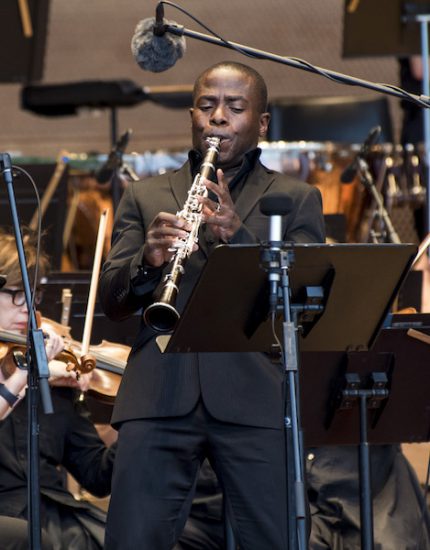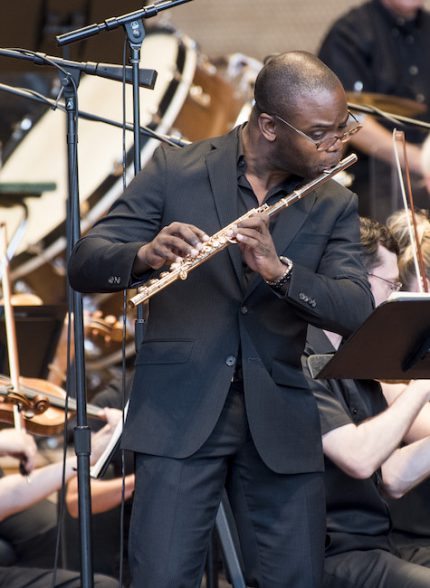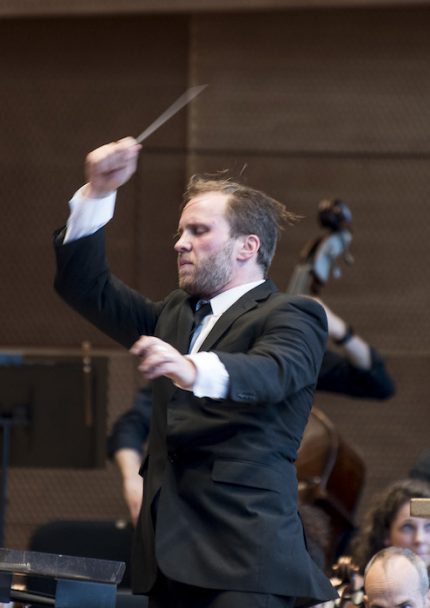Hometown soloists shine brightly; Danzmayr, Grant Park Orchestra deliver dramatic Dvořák

Contrasted program halves can provide bracing results, and such was the case with Friday night’s concert by the Grant Park Orchestra led by David Danzmayr. Light and engaging music filled the first half with a darkly dramatic late romantic symphony after intermission.
It was an inspired bit of programming to have Chicago’s own McGill brothers as the evening’s duo soloists. Born on the South Side, the brothers are both products of the Merit School of Music and have gone on to illustrious, high-profile music careers. Anthony McGill is currently principal clarinet of the New York Philharmonic and Demarre McGill, principal flute of the Seattle Symphony. Both men also frequently perform chamber music and as soloists.
Double concertos for flute and clarinet are not exactly thick on the ground, so the brothers McGill took matters into their own hands, commissioning Joel Puckett’s Concerto Duo, which was heard in its festival premiere Friday night.
Debuted in 2012 with conductor Allen Tinkham and the Chicago Youth Symphony Orchestra—of which both men are alumni—Puckett’s concerto is on the McGills’ recently released recording “Winged Creatures” (Cedille), which also includes music by Saint-Saëns, Franz Danzi and Michael Abels.
In his program note, Puckett relates that each of the three movements was inspired by a different toddler—a trigger warning of sorts for the non-familially inclined in the audience.
Happily, preciousness is kept to a minimum and, while no great deaths are plumbed, Puckett’s Concerto Duo is an attractive, smartly scored and engaging work, well suited to al fresco summer concertizing.

The energetic opening movement (“Great American Scream Machine”) was inspired by the title rollercoaster at Six Flags in Atlanta. That daunting ride is reflected in jazzy, hard-charging music, flute and clarinet throwing off fast riffs, both solo and together. The tempo slows down for an impressionistic middle section, with the soloists echoing each other’s lyrical lines, leading into a cadenza for both. The opening music returns to end the movement in exuberant fashion with ample bravura by both soloists.
The heart of the concerto is the middle movement (“Mama Dee’s Song for Joel”) a rocking lullaby the composer used to sing his daughter to sleep, which Puckett’s grandmother likewise sang to him as a child.
Anthony McGill brought deep expression to his opening clarinet solo, soon joined by flutist Demarre in this gentle, introspective idyll. An expansive melody for full orchestra appears—given sumptuous treatment by Danzmayr and the ensemble—which alternates with passages for the soloists.
The final movement (“For Audrey”) opens in similarly lilting fashion by the soloists. The tempo accelerates with arpeggios thrown back and forth by the soloists as the movement builds to a brilliant and virtuosic coda.
The McGill brothers brought customary technical aplomb, nuanced expression and vitality to their concerto with simpatico support by Danzmayr and the orchestra. The only disappointment was the lack of body and warmth in the steely amplified sound of the soloists’ instruments. Hopefully, better electronic results will be had at tonight’s repeat.
Saint-Saëns’ Tarantelle (also on their CD) served as a programmed encore of sorts. This Italian-flavored miniature is a six-minute trifle but the McGills brought enough personality and virtuosic sizzle to deliver the goods.
The evening began with Jimmy López’s Fiesta! Best known locally for his opera Bel Canto, commissioned by Lyric Opera and premiered in 2015— the Peruvian composer’s work offers a variety of lively “Pop Dances for Orchestra” in four brief sections.
Yet despite some promising melodic kernels in this 2007 work, with just two minutes per section López doesn’t have enough time to work the music into anything particularly worthwhile. One continuous movement with fewer themes and more development might have proven more effective.
Still, while the shade of Leonard Bernstein looms over the concluding “Techno” section, Fiesta! is scored with López’s typical panache and his Terpsichorean collage filled the bill as a lively festival curtain-raiser.
The second half was given over to Antonin Dvořák’s Symphony No. 7.
Though not heard as frequently as his Eighth Symphony and once-inescapable Ninth (“From the New World”), Dvořák’s Seventh stands as the Czech composer’s finest work in the genre. While just as thematically rich and surely crafted as his latter two symphonies, the Seventh is a darker, tougher work. The dramatic tautness and lack of frills extends even to the slow movement; rather than bucolic and charming in Dvořák’s previous vein, the Seventh’s Poco Adagio is brooding and bleak, morphing into a kind of stoic determination.

During his four-season tenure as music director of the southwest-suburban Illinois Philharmonic Orchestra, Danzmayr showed himself an inspired interpreter of romantic-era symphonies, and such was the case again Friday night.
The Austrian conductor has tamped down the hyperkinetic podium style of his IPO years, yet Danzmayr is no less a commanding figure. He led a highly focused Seventh that deftly balanced the light and dark elements, maintaining firm dramatic momentum without playing to the gallery. The slow movement was especially fine, the elusive expressive elements surely assayed and built into a stern, punchy climax
Perhaps the celebrated Scherzo might have benefited from a fractionally lighter touch to better bring out the Bohemian dance rhythms, yet the sense of lurking unease beneath the surface charm was manifest. The performance culminated in a superb finale, dramatic and intense with the final peroration, aptly, more grimly resolute than triumphant.
Danzmayr’s idiomatic direction drew first-class playing across all sections of the Grant Park Orchestra. The woodwinds in particular made the most of their spotlighted moments, with especially atmospheric contributions from flutist Mary Stolper and the GPO’s new principal clarinetist, Dario Brignoli.
The program will be repeated 7:30 p.m. Saturday. gpmf.org
Posted in Performances

